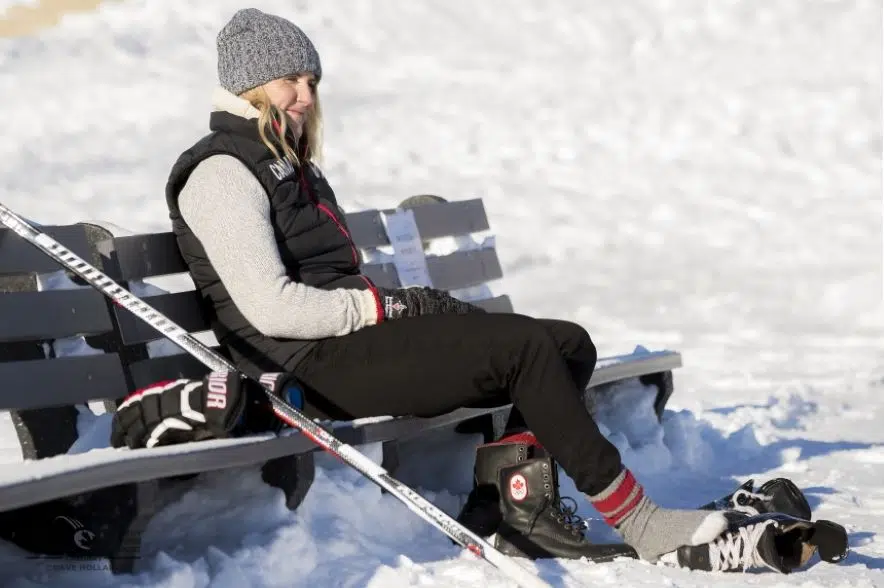Home is where the Hall is for Hayley Wickenheiser.
The Shaunavon-born hockey star is one of seven people being inducted into the Saskatchewan Sports Hall of Fame during a ceremony in Regina on Saturday.
“It means a lot,” the 45-year-old Wickenheiser told The Green Zone’s Jamie Nye. “Everything I really have in sports started in Saskatchewan …
“I’m very proud to be from Saskatchewan, and (with) so many great athletes in multiple sports – if you look at curling, bobsled, trampoline and of course hockey – it’s a well-represented class (going into the Hall).”
Wickenheiser is being inducted with fellow athletes Ryan Getzlaf of Regina (hockey), Jaime Boyer of Saskatoon (multi-sport) and Joan McEachern of Leroy (soccer), along with builders Lorne Lasuita of Wynyard (multi-sport) , Bernadette McIntyre of Bethune (curling) and Noreen Murphy of Saskatoon (softball).
In a twist of fate, Murphy was Wickenheiser’s coach with the Canadian junior women’s softball team.
While Wickenheiser was an accomplished ball player – she was part of Canada’s Olympic team at the 2000 Games in Sydney, Australia — she’s more widely recognized for her prowess on the ice.
The forward was a member of the women’s national team for 23 seasons until her retirement in 2017. She competed in five Winter Olympics (1998, 2002, 2006, 2010, 2014), winning four gold medals and one silver. She also appeared in 12 women’s world championships, winning seven gold medals and five silvers.
Wickenheiser retired as the Canadian team’s all-time leader with 168 goals and 211 assists in 276 games. She’s also the all-time points leader in the Olympics among men or women (51) and is the all-time scoring leader at the IIHF world championships (38 goals, 74 points).
She was inducted into both the Hockey Hall of Fame and the International Ice Hockey Federation Hall of Fame in 2019.
And it all started in Saskatchewan, where Wickenheiser overcame a number of hurdles in her early years in the sport.
“Growing up in Shaunavon, at that time – in the mid-’80s (and) ’90s – girls hockey was not that popular,” Wickenheiser told Nye. “I played with the boys. I was often the only girl on the ice in small little towns all across southwest Saskatchewan. I really developed a thick skin and learned how to not listen to criticism at a young age, because I faced a lot of it.”
Wickenheiser even remembered her mom, as she put it, “fighting” to get her daughter into a hockey school in Swift Current. Hayley quickly established herself on the ice, and people threw their support behind her.
“Whether it was my parents, my neighbours (or) the coaches in minor hockey, I seemed to be lucky enough to have a crew of people that as I grew up, they really surrounded me and sort of protected me from all the criticism,” she said.
“But (the biggest thing was) just the opportunity to keep playing the game – and of course the access to a lot of ice time, too. Being in Shaunavon, I remember there were no ice problems. We could jump on the ice pretty much whenever we wanted.”
Wickenheiser thanked her parents for all of their support during her hockey career, including the time, effort and money they gave up to help her along the way.
And as is the case with many young Canadian hockey players, an outdoor rink also played a big role.
“Those are some of my fondest memories today,” Wickenheiser said. “My dad said, ‘If you’re going to play hockey, you’ve got to be able to carry your hockey bag. I’m not going to carry it for you.’ I’d drag my bag a couple blocks to the rink when I was five (or) six years old or put it on the toboggan and pull it.
“You learn a lot of great life lessons about work ethic and discipline and just the pure joy of the game. When I struggled in the game through the years, I would always go back to the outdoor rink and just play around and that was my source of inspiration.”
Some 40 years later, Wickenheiser is now an inspiration for thousands of young hockey players.
Not only was she the best women’s hockey player in the world for decades, she also had stints with men’s pro teams in Finland and Sweden. Then she went to medical school. And now she’s the assistant general manager of the NHL’s Toronto Maple Leafs.
Her legacy – and those of other players of her ilk – undoubtedly helped lead to the formation of female leagues, including the new Professional Women’s Hockey League.
“I think (that league) is a great start,” Wickenheiser said. “Salaries seem reasonable. I hope that they can have a lot of success over the next few years and continue to build.
“Now if you’re a little girl playing hockey, it’s not just the Olympics or world championships. You can dream to be a professional hockey player – and that’s now a reality.”







